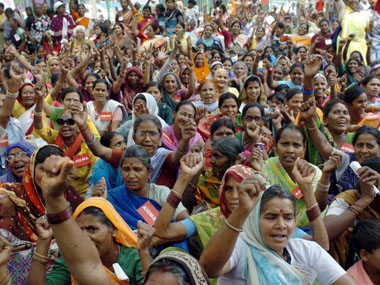Narendra Modi government’s decision to amend the Constitution to provide 10 percent reservation in college admissions and government jobs for so-called economically weaker sections (EWS) of people who are not covered by any of the existing schemes of reservation, has expectedly generated a lot of heat and dust. Not surprisingly, the political discourse has been twisted out of shape. The mainstream media has termed it as NDA’s ploy to “placate the upper castes”. Screaming headlines in newspapers and panel discussions in TV studios have found a direct connection between the timing of the decision and the BJP’s losses in three Hindi heartland states where the saffron unit seems to have lost quite a bit of ground among upper castes — its traditional support base. It is being said that the BJP was at the receiving end of a backlash from upper-caste groups who are worried with the loss of economic empowerment and social privileges and became annoyed with the Modi government for restoring the provisions of the Scheduled Caste and Scheduled Tribe (Prevention of Atrocities) Act that had been diluted by the Supreme Court. That move was interpreted as “appeasement politics” and resulted in counter-mobilisation and protests among upper-caste voters and led to BJP’s losses in Madhya Pradesh and Rajasthan, say analysts. [caption id=“attachment_427828” align=“alignleft” width=“380”] Representational Image. AFP[/caption] In this context, the Union Cabinet’s move to extend 10 percent reservation in central jobs and educational institutions to the EWS among all castes and communities including Christians, Muslims and others — in addition to the Supreme Court-mandated 50 percent cap for SC, ST and other OBCs taking total figure to 60 percent — is being called a “political masterstroke” that brings everyone within the quota pie. Though the government’s proposal for introduction of The Constitution (One Hundred and Twenty- Fourth Amendment) Bill stresses on extending benefits to “the economically weaker sections of the people who are not covered by any of the existing schemes of reservation”, by targeting the poor within the general category, the move is being seen as a placatory gesture for angry upper caste communities and once-assertive agrarian groups such as the Patidars, Jats, Gujjars and Marathas. The opposition to the government’s proposed legislation can be broadly categorised into three parts. Moral, legal and political. The moral objection to reservation is spurious. The Constitution mandates reservation on grounds of social and educational backwardness. Yet, as a report in Hindustan Times points out, government’s proposed move is estimated to benefit 190 million people. It is not a small number. The bill defines EWS households as those with an annual income less than Rs 8 lakh, having land under five acres, a house less than 1000 square feet; a residential plot less than 100 square yards in notified municipalities; and a residential plot less than 200 square yards in other municipalities, according to a
report in Hindustan Times. The repercussions and impact of this legislation — if it goes through — will be much more than merely addressing upper caste angst. It is specious logic to label this income-based and caste-and-religion-agnostic reservation as a ‘poll ploy’. It addresses the a segment of the society that badly needs a little leg-up from the state and by bringing everyone within the quota net (including religious minorities) it aligns with the Modi government’s dictum of ‘appeasement of none, justice for all’. The case for reservation in favour of economically backward sections of the society is greater, stronger and morally more justifiable than other metrics. The effectiveness of reservation as a tool to address inequality may be the subject of a debate, but it is difficult to argue against a move to give economically disadvantaged a chance. The government’s legal challenge could be steeper to surmount given the 1993 Supreme Court verdict that restrict quota benefits to 50 percent of the population but the government may argue that the Constitution does not bar the government from bringing in a legislation to address the economically backward section. The political challenge to the move is understandable. The Opposition has seen red with the timing of the proposed bill and has called it an election gimmick. The Opposition’s charge is not unjustified. If the government was keen to address the economically weaker section through reservation, it could have brought the legislation earlier. It may have calculated that the impact of the move will be greater closer to the Lok Sabha election date and it would be difficult for political parties to publicly oppose the move and risk alienating upper caste voters. While the charge is justified, outraging over it makes little sense. If Opposition’s ploy to mobilise upper-caste voters by pandering to their sentiments is a ‘good political strategy’, the BJP should also be extended the benefit of the same argument. The BJP can’t seriously be expected to go belly up and play dead when it senses a drift in its traditional base. It’s a political ploy to counter other political ploys and in that sense it is no better or worse. Only a political ploy can enable an atmosphere for income-based reservations instead of caste-based ones (that Thomas Piketty has called a “possible evolution in the long run”) in a hyper-polarised polity where caste equations are integral to politics. Modi government’s move is smart and topical.
Narendra Modi government’s decision to amend the Constitution to provide 10 percent quota for economically weaker sections of the upper caste has generated a lot of heat and dust. Not surprisingly, the political discourse has been twisted out of shape.
Advertisement
End of Article


)
)
)
)
)
)
)
)
)



